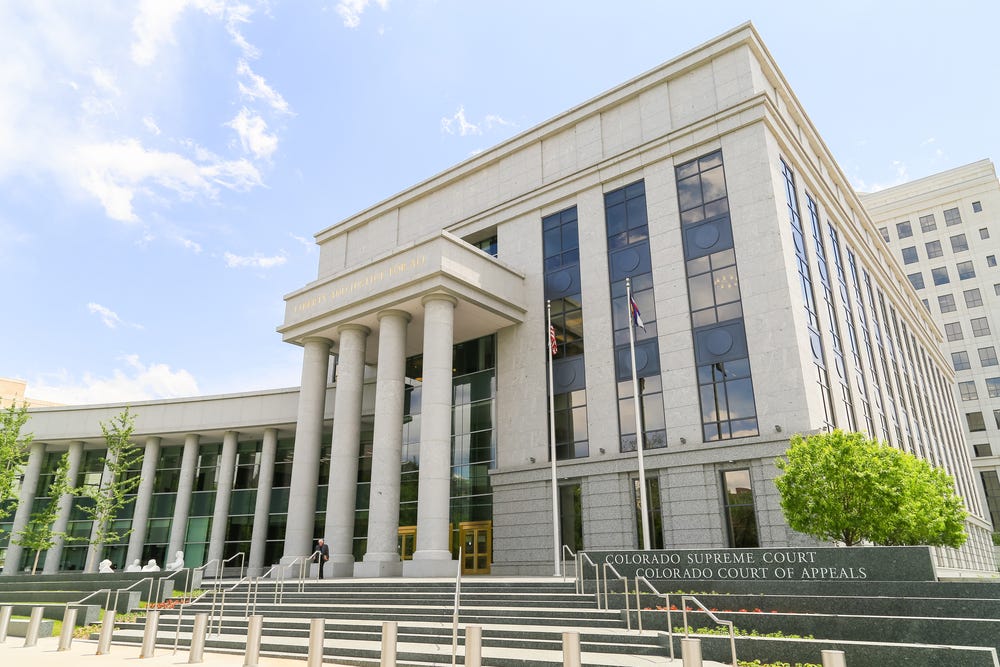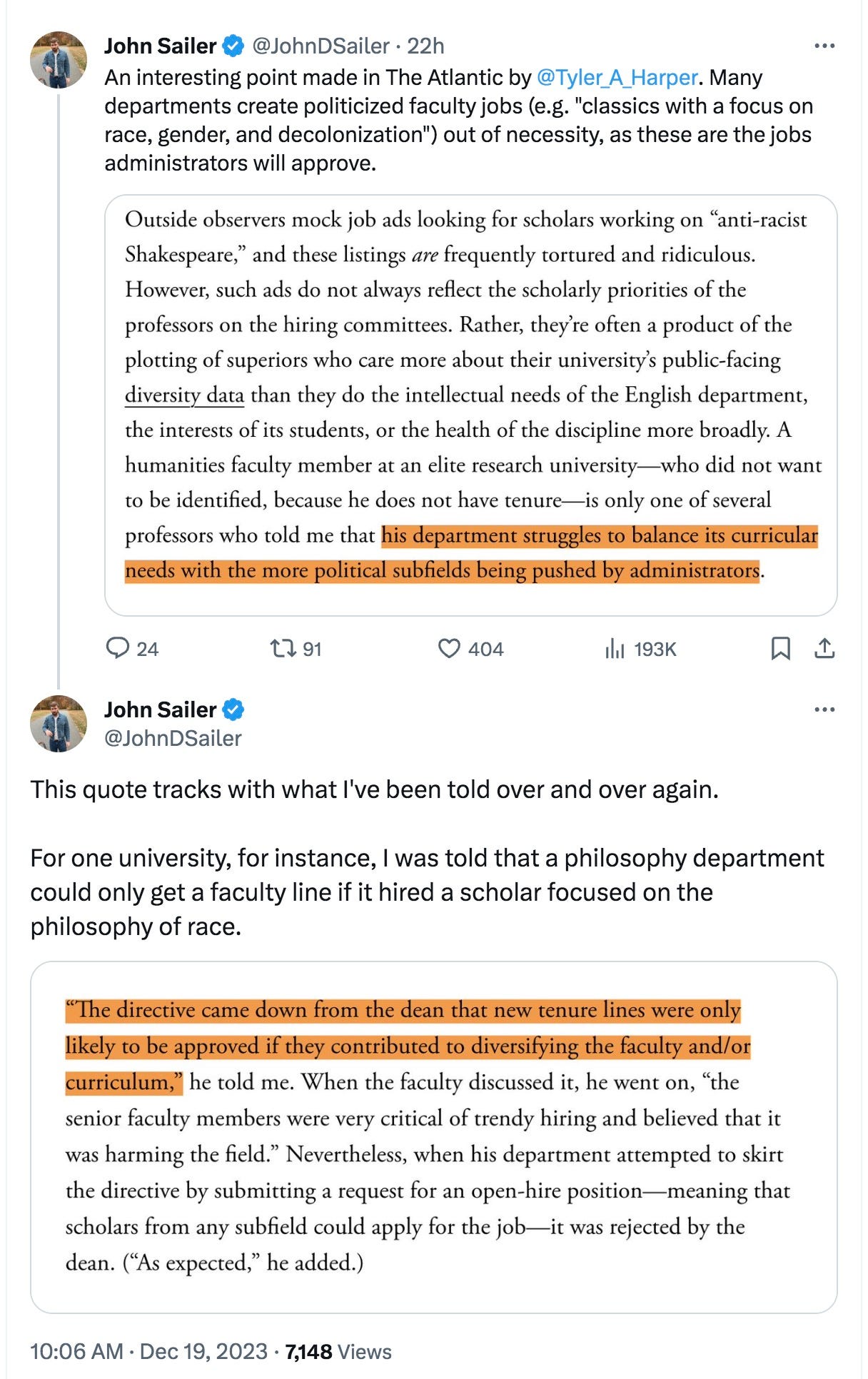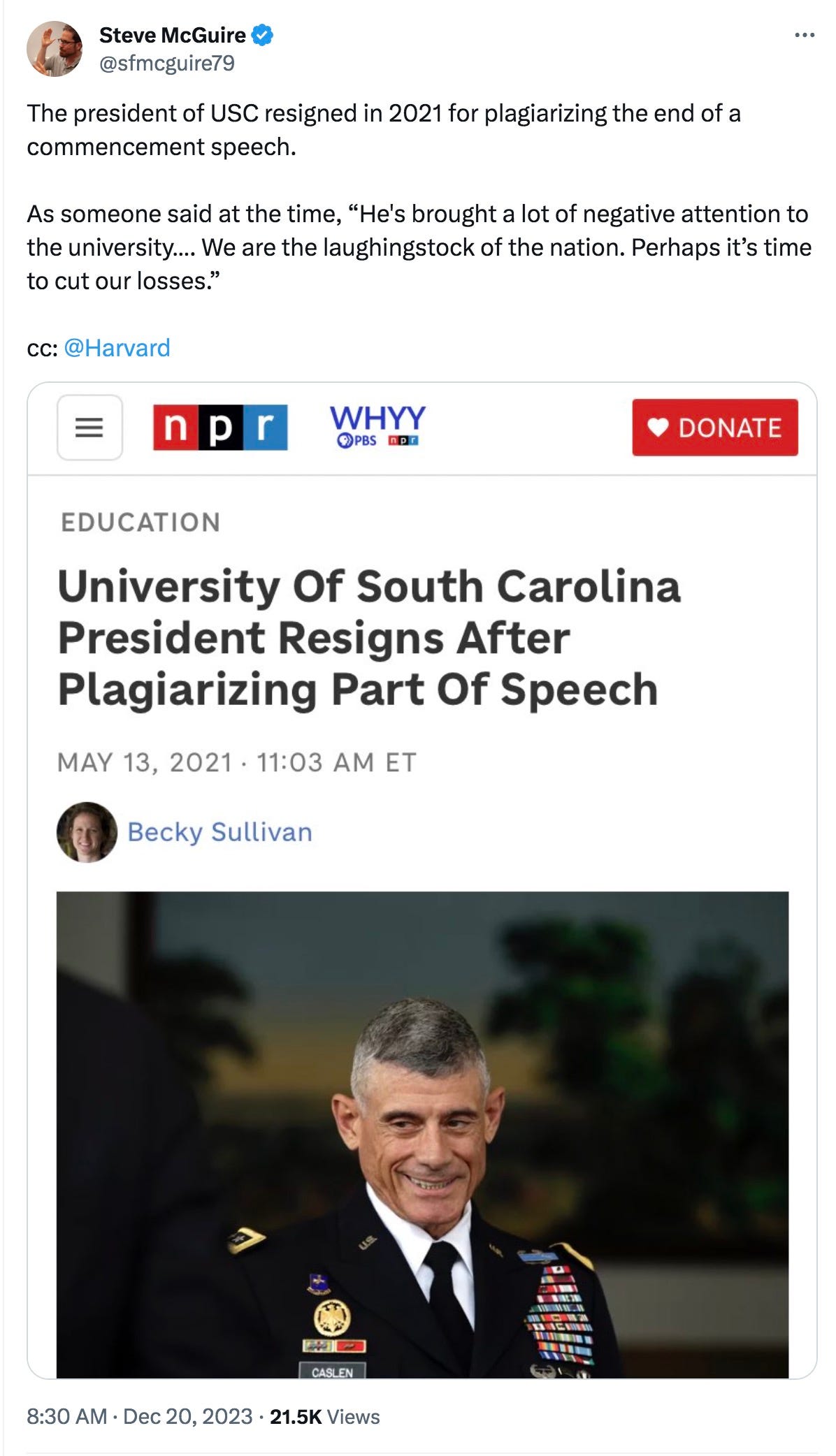E-Pluribus | December 20, 2023
Democratic, but wrong; skewed moral compasses; and campus free speech must be protected no matter who it offends.
A round-up of the latest and best musings on the rise of illiberalism in the public discourse:
Charles C. W. Cooke: The Problem with the Colorado Supreme Court’s Decision Is That It’s Wrong
There is an unfortunate tendency on both sides of the ideological divide to tout court decisions benefiting our side as upholding the rule of law and those that go in the other direction as undemocratic. In the case of the Colorado supreme court decision to keep Donald Trump off the ballot in 2024, Charles C. W. Cooke argues at National Review that while he disagrees with its conclusion, the court ruling on the application of our democratically approved Constitution is well within democratic norms.
By design, there are many provisions within our Constitution that limit what the public is able to vote for, and sometimes even for whom. Without amending the Constitution, a transient majority of Americans cannot elect a president for a third term, hold midterm elections more than once every two years, abolish elections completely, restrict the freedom of speech, deny the accused their right to a trial, seat Article III judges without the acquiescence of the U.S. Senate, impose taxes without congressional approval, and so on. We have a process for doing things in the United States, and the Constitution sits at the peak of that process. If the Constitution says something, then that something obtains until the Constitution doesn’t say it any more. If, as the Colorado supreme court seems to believe, Article 3 of the 14th Amendment to the Constitution really does bar Donald Trump from political office, then Donald Trump must be barred from political office, and, unless one’s goal is to reject the very idea of constitutional government, complaining about that fact is fruitless.
[. . .]
If one believes that Section 3 of the 14th Amendment truly does disqualify Donald Trump from office, then one is not not rejecting democracy or the rule of law, but demanding that it be sustained. The 14th Amendment was ratified by a supermajority according to the process laid out in Article V, and it is thus good law. When it applies, it must be applied.
And when it doesn’t apply? Then it shouldn’t be applied.
I’ll reiterate that I’m really not trying to be pedantic here. I understand that, in some sense, “undemocratic” is shorthand for “legally incorrect, with undemocratic consequences.” But the logic of the argument I’m seeing — that it’s outrageous in all circumstances for a court to take someone off the ballot, and thereby deny the public the chance to vote for or against him — extends much too far beyond the material inquiry. There are multiple provisions within our system that exclude people from electoral consideration, either temporarily or permanently. We have impeachment, by which supermajorities within the elected federal legislature can use a provision ratified by a majority to declare a given candidate outré. We have minimum-age and “natural born Citizen” provisions that govern who is eligible to run. And, at the state level, we have all manner of ballot rules with which aspirants must comply. If unelected figures bend those regulations in ways that do not comport with what the people originally passed, we have a problem. If they uphold them — and thereby ensure the integrity of the democratic process and the rule of law — we do not.
Read the whole thing.
Jackson Greenberg: The Unconscientious Objectors
In an essay that original appeared at Tablet, Jackson Greenberg writes at The Free Press that decades of so-called progressive education have corrupted students’ moral compasses. “Truth” is taught as personal rather than established facts and true principles. When the blind lead the blind, both end up in a ditch.
In my eleventh grade American Literature class at a private school in the Philadelphia suburbs, our first assignment was to bring an object to class that represented America. Setting aside the inanity of having 16-year-olds perform show-and-tell—and presenting it as “education”—that day stuck with me for another reason.
One of my classmates, a fellow member of the student orchestra, held up a baseball card, explaining, “This is the first African American player to play professional baseball: Doug Glanville.” Glanville is indeed black and was an excellent center fielder for the Philadelphia Phillies in the 1990s. But he was, as anyone who is familiar with the history of baseball can tell you, not the first African American to play baseball professionally.
I raised my hand. The teacher called on me. “That’s not right,” I started to say. My teacher stopped me. “Let him finish,” she said, gesturing toward the student. When he was done, the teacher nodded and said: “Thank you for that illuminating presentation. Who’s next?”
[. . .]
Fast-forward two decades and the effects of this John Lennon “imagine there are no countries” (a song we sang frequently in lower school assemblies) style of education has come to maddening fruition: support for the terrorist group Hamas. I tried last week to confront a former classmate—and fellow Jew—who has been using her Instagram to call for an immediate cease-fire. Since she works in tech and likes to meditate, I figured I’d send her Sam Harris’s recent podcast titled “The Bright Line Between Good and Evil.” In it, Harris highlights the distinction between innocent, peace-loving Israelis and violent jihadist terrorists: “There is a bright line between good and a very specific form of evil that we must keep in view. It is the evil of bad ideas—ideas so bad that they can make even ordinary human beings impossible to live with.” (Somewhere my Spanish teacher is gasping.)
This was my classmate’s response: “Although, as both a Jew and compassionate human, I mourn the loss of Jewish life and uptick in antisemitism, I won’t stand behind the destruction of any life. In any form, by anyone. Whether it’s Israel, the U.S., Italy, or an organization like Hamas, I will never support violence or war in the name of self-defense, because if your existence comes at the cost of someone else’s life, then who are you? What kind of self is that?’”
A self that is. . . alive? A self that is not raped or tortured, whose loved ones aren’t kidnapped and beaten?
[. . .]
To my pacifist former classmates, to the 48 percent of 18- to 24-year-olds who don’t condemn Hamas, and to everyone else: we Jews are not asking you to fight. We’re just asking you to stop trying to inhibit those who are. Those who are trying, bravely, to protect your right to dance at Coachella without having to worry about paragliders with machine guns. Those trying to protect the right of women to dance at all. Those protecting Jews’ right to exist.
We’re not asking you to teach English on Zoom to Israeli children whose teachers have been killed or called into reserve duty. Or to send money to the Tel Aviv Sexual Assault Crisis Center or to the Nova Musical Festival Survivors’ Fund. We’re just asking you to simply acknowledge that in some moments, like this one, there is a clear right (free democracies) and a clear wrong (jihadi terrorists), and sometimes the path to defending what is right is difficult. And if your modern show-and-tell education won’t allow you to publicly acknowledge this simple truth, at the very least stop reposting Jewish Voice for Peace (not really Jewish, definitely not peaceful).
Read it all here.
Evelyn Douek and Genevieve Lakier: The Hypocrisy Underlying the Campus-Speech Controversy
Are Republicans now trying to do to universities what Democrats have been trying to do to social media companies? Writing at The Atlantic, Evelyn Douek and Genevieve Lakier make the case that while it is proper to insist that colleges address and work to prevent discrimination and harassment on their campuses, governmental pressure to control speech can easily run afoul of the First Amendment regardless of the source and content of the speech in question.
Earlier this month, Congress held a dramatic hearing with the heads of three private corporations that manage important forums for public debate. Members of Congress criticized these leaders in the strongest possible terms for their alleged failure to stem harmful speech on their property. The White House weighed in the next day to denounce the leaders’ equivocal answers, and both the Biden administration and Congress have announced multiple investigations into whether these and other institutions have violated federal law by not cracking down on this speech.
The previous paragraph obviously describes the efforts by federal lawmakers to pressure university presidents to more aggressively police anti-Semitic speech on campus. But it could just as easily describe another recent pressure campaign—the one directed at social-media platforms. These companies’ CEOs, too, have been hauled before Congress to account for their speech rules, had their policies denounced by the White House, been threatened with legal liability, and had private communications with government employees about what speech they allow on their platforms.
Despite these similarities, the two pressure campaigns have been received very differently. The Biden administration’s effort to influence social-media platforms’ content policies sparked a vociferous outcry from Republican officials, culminating in a First Amendment lawsuit that is now before the Supreme Court. The pressure campaign over university speech policies, by contrast, has generated very little alarm about the First Amendment interests of either the schools or their students. This is a problem, because the threat of government interference with free speech is very real in both contexts.
[. . .]
In fact, the amount of pressure being wielded against universities may outstrip what social-media companies have faced. Despite constant threats, hearings, and proposed legislation, the platforms’ broad immunity from liability provided by Section 230 of the Communications Decency Act remains intact, and the prospect of legislative reform remains as elusive as ever. Contrast this with the very immediate threat of legal liability for universities under Title VI of the Civil Rights Act, which prohibits discrimination on the basis of shared ancestry or ethnic characteristics. The Department of Education has announced investigations into more than a dozen schools over whether they have violated Title VI by not cracking down sufficiently on anti-Semitic and Islamophobic speech. University officials have disclosed that DOE officials have also privately warned universities that they must act against specific controversial pro-Palestinian statements such as “From the river to the sea, Palestine will be free”—which, as many have noted, is in most contexts protected speech under the First Amendment. Members of Congress are working on a bill to strip schools of federal funding, and have agreed to a bipartisan resolution calling on Harvard’s and MIT’s presidents to resign. These are very serious threats for universities already facing immense pressure from donors and alumni to do more to restrict student speech.
Read it all.
Around Twitter (X)
John Sailer comments on the pressure university departments are facing from DEI-obsessed administrations:
The thread continues after the excerpt below, but here are the first four principles the Foundation for Individual Rights and Expression propose that college and universities adopt going forward to ensure adherence to their primary mission:
And finally, Steve McGuire suggests that Harvard borrow a page from USC’s playbook during a similar controversy in 2021:









